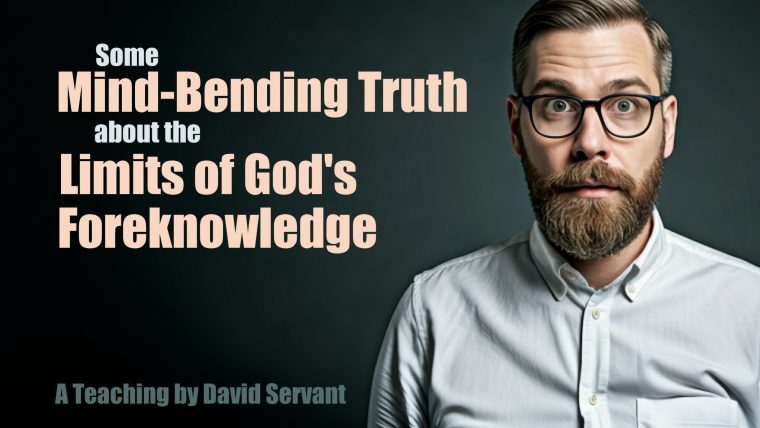
Non-Calvinists often object to Calvinism’s doctrine of “Unconditional Election” based on its perceived injustice and immorality. Calvinists claim that only a minority of people are divinely and sovereignly predestined to be saved, and their being selected is based on nothing that God foresaw in them that pleased Him. That means that all others are predestined to be forever damned. It is therefore “double-predestination.” Non-Calvinists often say Calvinists, “Your doctrine of Unconditional Election makes God look like a monster, because you are saying that He created people just to torture them forever.”
Calvinists often retort by saying, “But you believe that God foreknows everyone who will choose to believe in Jesus and who will not choose to believe in Jesus, and yet He still creates the ones whom He knows will not believe in Jesus, and then He tortures them forever. So, if my God is a monster, so is yours!”
That may seem like a pretty compelling argument. But it overlooks one vital fact. That is, God can’t foreknow what free moral agents will do unless they are tested at some point in time. Otherwise, there is nothing for God to foreknow. So, once there is an outcome of any free moral agent’s test, it is too late to decide to create or not to create that free moral agent.
That concept, of course, is impossible for us to fully grasp, as time is sequential and linear for us. But God lives outside of time. Still, He can’t foreknow the choices of free moral agents unless those free moral agents are given the opportunity to make choices.
Here is an example that will hopefully make this clearer if you are struggling to understand it. Imagine that you had the amazing ability to correctly foretell the outcome of every professional football game played this year. One hour before every game, you foretold the final score, and for an entire season, you demonstrated that you were never wrong.
So, imagine that for the next football season, it was decided that, instead of actually playing any games and risking injury to the players, they would just ask you who would have been the winner at each day’s game.
So, at the first game of the new season, all the fans come to the stadium, the players and coaches from both teams line up on either side of the field, and then they bring you to center field and give you a microphone. Then you are asked, “Last year, you correctly foretold the final score of every professional football game. So please tell us now, who would have won today’s game?” What will be your answer?
You will have to say, “I don’t know!” And why won’t you know? Because you don’t foreordain the outcomes of football games. You only foreknow the outcomes. So the games must be played if there is going to be an outcome for you to foreknow.
Similarly, God cannot know the outcomes of the tests of free moral agents unless they are actually tested. And this is why we so often find in Scripture passages that declare that “God tested” someone. For example, after God tested Abram He said, “Now I know that you fear God, since you have not withheld your son, your only son, from Me” (Gen. 22:12, emphasis added). Of course, God foreknew what Abram would do, but in the realm of time, the knowledge of the outcome of Abram’s test only became evident when Abram was actually tested. All of this is to say that there are limits to foreknowledge.
Again, all of this is beyond our finite minds. Science fiction writers love to toy with the mind-bending aspects of time travel, and imagine how, if the past was changed, so would the future then be changed. For example, could an old man who was bitter at his deceased father, if he had the ability to travel back in time, go back to when his father was ten years old and murder him? No, because if he did that, that would mean he himself would never be born (which in itself would make it impossible for him, as an old man, to go back in time and murder his father). I’m only sharing that example to illustrate how it is impossible it is for us to grasp time not being linear and sequential.
In any case, all of this can help us understand how it can rightly be said that God could not foreknow how corrupt the free moral agents He would create would be unless He created them and placed them in an environment where they would be tested. And that is why we read scriptures like Genesis 6:5-6: “Then the Lord saw that the wickedness of man was great on the earth, and that every intent of the thoughts of his heart was only evil continually. The Lord was sorry that He had made man on the earth, and He was grieved in His heart.” One version says that “God regretted that He had made man.”
So, did God foreknow the Fall? Yes. But He could not have foreknown it unless it happened in the realm of time. Apparently, God felt that creating free moral agents was worth the risk of negative outcomes for the hope of some positive outcomes. If you are a believer in Jesus, you are one of those positive outcomes!

